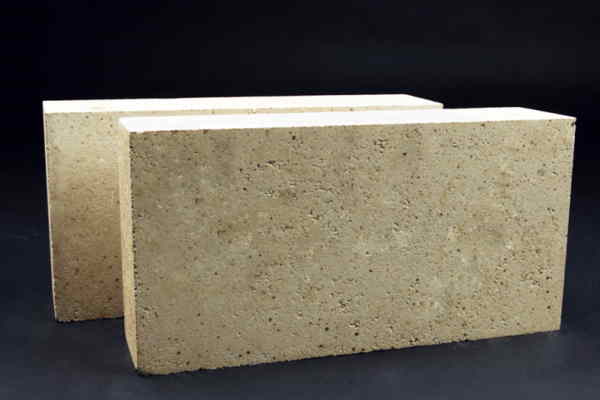Refractory bricks are a type of special ceramic material used in high-temperature environments.
These firebricks for sale must withstand high temperatures and resist chemical attack from various sources. One of the most common types of attack comes from alkali compounds.
introduzione
Refractory bricks are a critical component of high-temperature industrial processes, such as steel production, produzione del vetro, e produzione di cemento.
They are designed to withstand high temperatures, mechanical wear, and chemical corrosion.
The chemical corrosion can come from various sources, such as slag, molten metal, and gases. One of the most common sources of chemical corrosion is the presence of alkali compounds.
Alkali compounds can react with refractory materials and lead to corrosion and failure of the refractory lining.


What Are Refractory Bricks?
Refractory bricks are a type of ceramic material that can withstand high temperatures and harsh environments.
They are made from various raw materials, come allumina, silice, magnesia, and zirconia. Refractory bricks are used in a wide range of applications, such as furnaces, forni, caldaie, e inceneritori.
They can be classified into different categories based on their chemical composition, conduttività termica, and mechanical properties.
Alkali Resistance of Refractory Bricks
The resistance of refractory bricks to alkali attack depends on their chemical composition and microstructure.
Alkali resistance is defined as the ability of the refractory material to withstand the corrosive effect of alkali compounds.
Alkali resistance is an important property for refractory materials used in applications where they are exposed to alkali-rich environments, such as cement kilns and waste incinerators.
Types of Refractory Bricks with Good Alkali Resistance
There are several types of refractory bricks that have good alkali resistance. The most common types are:
Mattoni di magnesia
Magnesia bricks are made from magnesia, a natural mineral that is rich in magnesium oxide (MgO).
Mattoni refrattari alla magnesia have excellent alkali resistance due to the high content of MgO.
MgO reacts with alkali compounds to form stable compounds that do not corrode the refractory lining.
Magnesia bricks are used in applications where they are exposed to alkali-rich environments, such as cement kilns and waste incinerators.
Chrome-Magnesia Bricks
Chrome-magnesia bricks are made from a mixture of magnesia and chrome oxide (Cr2O3).
Chrome-magnesia bricks have excellent alkali resistance due to the high content of MgO and the formation of stable compounds with alkali compounds.
Chrome-magnesia bricks are used in applications where they are exposed to high temperatures and alkali-rich environments, such as glass furnaces and incinerators.
Alumina-Silica Bricks
Alumina-silica bricks are made from a mixture of alumina and silica.
They have good alkali resistance due to the formation of a stable layer of mullite (Al6Si2O13) ad alte temperature.
Mullite is a compound that is stable in the presence of alkali compounds and does not corrode the refractory lining.
Alumina-silica bricks are used in applications where they are exposed to high temperatures and moderate alkali environments, such as aluminum smelters and glass furnaces.
Mattoni di zircone
Zircon bricks are made from zirconia (ZrO2), a ceramic material that has excellent resistance to alkali compounds.
Zircon bricks are used in applications where they are exposed to extremely high temperatures and severe alkali-rich environments, such as steelmaking and glass melting.


Characteristics of Refractory Bricks with Good Alkali Resistance
Each type of refractory brick has its own unique characteristics that make it suitable for specific applications. The characteristics of refractory bricks with good alkali resistance are as follows:
Mattoni di magnesia
High refractoriness
Buona resistenza agli shock termici
Excellent alkali resistance
Bassa conducibilità termica
Chrome-Magnesia Bricks
High refractoriness
Excellent thermal shock resistance
Good alkali resistance
Buona resistenza all'erosione
Alumina-Silica Bricks
Good refractoriness
Excellent thermal shock resistance
Good alkali resistance
Bassa conducibilità termica
Mattoni di zircone
Very high refractoriness
Excellent thermal shock resistance
Excellent alkali resistance
Bassa conducibilità termica
Applications of Refractory Bricks with Good Alkali Resistance
Refractory bricks with good alkali resistance are used in various industrial applications, ad esempio:
Cement kilns
Glass furnaces
Produzione dell'acciaio
Waste incinerators
Aluminum smelters
Petrochemical plants
Conclusione
Insomma, refractory bricks with good alkali resistance are essential for high-temperature industrial processes.
The different types of refractory bricks, such as magnesia firebricks, chrome-magnesia firebricks, alumina-silica firebricks, and zircon firebricks, have their own unique characteristics that make them suitable for specific applications.
The characteristics and applications of these refractory bricks are crucial to ensure that they perform optimally in the harsh environments they are exposed to.
FAQs
1. What is the difference between magnesia and chrome-magnesia bricks?
Magnesia bricks are made from magnesia, while chrome-magnesia bricks are made from a mixture of magnesia and chrome oxide.
2. What is the most suitable refractory brick for steelmaking?
Zircon bricks are the most suitable refractory bricks for steelmaking due to their excellent alkali resistance and high refractoriness.
3. Can refractory bricks with good alkali resistance be used in petrochemical plants?
Yes, refractory bricks with good alkali resistance can be used in petrochemical plants where they are exposed to alkali-rich environments.
4. How do refractory bricks resist alkali attack?
Refractory bricks resist alkali attack by forming stable compounds with alkali compounds that do not corrode the refractory lining.
5. What is the difference between refractory bricks and ceramic materials?
Refractory bricks are a type of ceramic material that is designed to withstand high temperatures and harsh environments, while ceramic materials are used in various applications, such as pottery and electronics.
—PER Refractory Team
